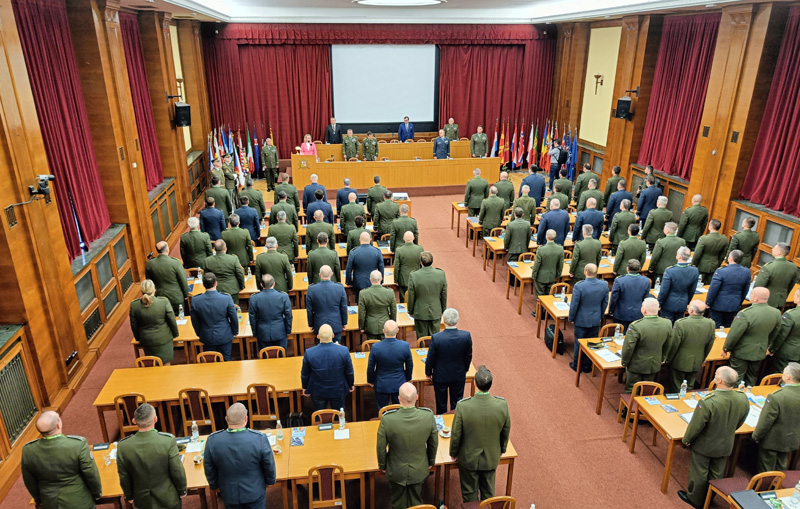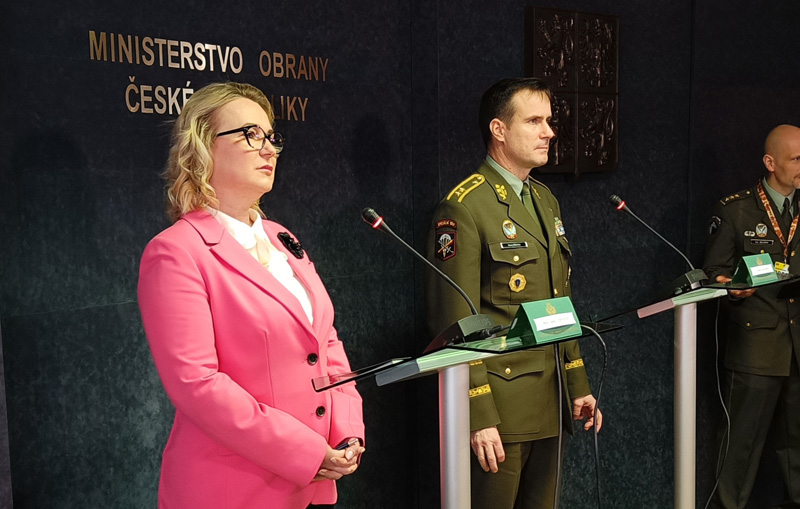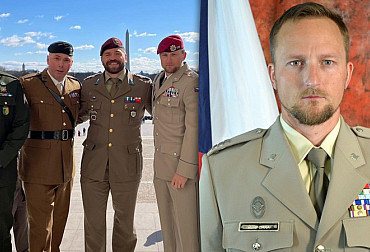Chief of General Staff General Karel Řehka: We must strive for Ukraine's military victory
The Commanders' Assembly, which took place on 21 February at the Ministry of Defence of the Czech Republic, was aimed at evaluating the main tasks of the Army in 2022. The meeting was also attended by Defence Minister Jana Černochová. The assembly was held almost to the day exactly one year after the then Chief of the General Staff, Army General Aleš Opata, warned of new tasks facing the Army and threats, including a possible Russian attack on Ukraine.
 Picture: The Commanders' Assembly, which took place on 21 February at the Ministry of Defence of the Czech Republic, was aimed at evaluating the main tasks of the Army in 2022. | Jan Zilvar / CZ DEFENCE
Picture: The Commanders' Assembly, which took place on 21 February at the Ministry of Defence of the Czech Republic, was aimed at evaluating the main tasks of the Army in 2022. | Jan Zilvar / CZ DEFENCE
It was the war in Ukraine that General Řehka addressed in his introductory speech, when he pointed out that Czech society had long failed to acknowledge the possibility of a Russian-led armed conflict under the impression that war was not imminent in our region. This is despite security and military analyses. "It was convenient because we did not have to sacrifice much effort, money or human lives for our own defence. When I say "we", I mean the whole society. But it has had, is having, and will have direct effects on us soldiers," Řehka said in his introduction. "The past year has therefore been a year of challenges for our military that we have never had to face before," the Chief of General Staff continued, praising the political support and the fact that we as a country are on the right side. "This is a huge motivation for us soldiers," he added. He then described thirty years of freedom, peace and security as an anomaly rather than the rule in our modern history. "War in Europe is not unthinkable and we will not be able to prepare for it if we do not prepare in the long term already in peace," he stressed. These preparations, according to Řehka, may then mean providing Russia with legitimate targets for weapons that can already reach our territory today. "Russia will not wait for us to organize and go somewhere on the battlefield to kill its soldiers. It will react now. The life of every soldier and citizen of the Czech Republic will be immediately turned upside down, everything will be different. Does that sound terrible? Yes, but let's describe what would happen truthfully and not kid ourselves. Let's be really glad that we are part of the strongest military alliance, that we are not alone in our defence. It makes it less likely that we'll be threatened. Our membership of NATO is the best deterrent we can achieve. We in the military are well aware of this, and for those who are not, it's time to change that quickly," Řehka warned. And this conflict would not last just a few weeks, he said, which is why it is necessary to remember that we have a statutory conscription, that there is a system of mobilisation and that it is not only the Army that is involved in defence. According to Řehka, this does not mean scaring the society. "However, it is necessary to say things straight and inform the public about it. It is part of building resilience and defence," the general explained. "Russia is not going anywhere and will continue to be dangerous, less predictable, more hostile and aggressive, perhaps frustrated, full of hatred and desire for revenge. The important moment is Ukraine's military victory on the battlefield," General Řehka said, adding that we must strive for Ukraine's military victory. In the future, he said, we must prepare for a possible clash between Russia and the North Atlantic Alliance. This is the only way to avoid the next war with Russia, according to the Chief of General Staff. "Even if we talk about a horizon of ten or even fifteen years, this need is very urgent and we must not waste a day. Because building defence does not happen quickly. We have to start now," Řehka appealed. The important thing, he said, is not to provoke war but to avoid it, and therefore Russia must be deterred from it.
In the next part of the commanders' assembly, the Chief of General Staff presented the necessity to modernise the Army. According to Řehka, the Army now has the resources to finance its modernisation. He said the Czech Republic faces a real threat and the Army must not squander the social will to invest in defence. "We have to make up for problems in all areas, information support, firepower, mobility and troop protection. Starting with logistics, command, control and communications," the general said. "We have a real threat and we have to deal with it. That's our job. And it doesn't matter how difficult it is," Řehka warned. The Army will actively propose solutions and will not be afraid to experiment, the general said. "No one should be afraid to change something because if they fail they can be punished. Soldiers should have the moral courage to tell even unpleasant truths. My years of service in the Special Forces have taught me that the vast majority of worthwhile and successful initiatives start from the bottom," Gen. Řehka stressed. The Army's combat capability also remains a major goal for him. "Practice, test, experiment. If something doesn't work, change it. If you can't change it, push your command. One of my priorities is to accelerate modernization. We have the resources to fund it and it's a great opportunity. We need to act here and now. I am well aware of the burdens, personal sacrifices, and sometimes frustration such a deployment brings, especially for my colleagues on the General Staff. We have to deal with rapid and sometimes unsystematic changes, because developments are rapid and assignments change on the fly. Nevertheless, I ask you all to persevere and continue to support our common cause. We face a real threat and we have the opportunity to do something about it. We must not squander the social will to invest in defence! We can only succeed as one team," the Chief of General Staff concluded.
 Picture: Defence Minister Jana Černochová and Chief of the General Staff Maj. Gen. Karel Řehka | Jan Zilvar / CZ DEFENCE
Picture: Defence Minister Jana Černochová and Chief of the General Staff Maj. Gen. Karel Řehka | Jan Zilvar / CZ DEFENCE
In her speech, Defence Minister Jana Černochová thanked the Army and recalled the moments last year when the Commanders' Assembly was held practically on the eve of war. "Until the last moment I believed that the crisis in the East would be resolved diplomatically and that there would be no need to massively strengthen the eastern wing of the North Atlantic Treaty Organisation," the minister said in her introduction. She said that the meaningfulness of NATO and the unity of the West, which professes democracy, had been confirmed. Černochová praised the support provided to Ukraine by the Czech Republic. According to the Minister, the cumulative assistance of our country amounting to nearly CZK 5 billion is proof that we are not and cannot be indifferent to the fate of Ukraine. Czech armourers are also sending weapons to Ukraine; last year they exported military material worth more than CZK 50 billion to the country attacked by Russia.
The Minister also returned to the modernisation of the Army. "We all know very well that to maintain this high standard, soldiers need adequate equipment, i.e. truly 21st century technology. And I hope I have good news for you that our big strategic projects are really getting off the ground. The re-equipment of the 7th Mechanised Brigade with CV90 infantry fighting vehicles is already taking on clear and tangible contours. We are coordinating the process with Slovakia, which has followed the same path as we have, thus achieving more favourable conditions. The first steps of modernisation have already been noticed by our tankers, who are gradually taking over the Leopard 2 A4 tanks. The United States of America has been a great help in our modernisation. I am pleased that our cooperation has taken on such dimensions that we are close to signing a bilateral defence cooperation agreement, the so-called DCA," the Minister said. In this context, she also recalled the US donation of eight American H-1 helicopters. The Czech Republic will receive six combat and two transport helicopters, with the first machine arriving in the Czech Republic in about a month. In addition, the defence ministry is negotiating with the US on the possible acquisition of US F-35s.
In her speech, Černochová also praised the performance of our soldiers abroad, who, for example, during the construction of an international base for the Battlegroup in Slovakia, completed all tasks on time. The Czech Republic, by the way, is a commanding country. The Minister also recalled that the Czech Republic will also lead the MFO mission in Sinai, which will supervise the compliance with the peace treaty between Israel and Egypt. According to the Minister, this shows the high reputation of the Army. As an important moment for personnel stabilisation in the Army, Černochová pointed out not only the work with the Active Reserves, but especially recruitment. At the end of her speech, she recalled not only the implementation of the Ten Commandments for Defence, which she had set out at the beginning of her tenure in the ministry, but also the defence legislation that is awaiting approval in the Chamber of Deputies. These are in particular the so-called voluntary predetermination and the law on defence financing. Here, it is expected that, following the revision of the government's programme statement, the goal will be to reach 2% of GDP in defence spending as early as 2024.
At the subsequent press conference, we asked Defence Minister Jana Černochová whether acquisition processes, whether ongoing or planned, can be accelerated in any way, for example through direct government-to-government negotiations. In her answer, the Minister recalled the limit of not only the production but especially the human capacity of the Ministry of Defence. "You will have noticed that General Řehka and I thanked the soldiers and civilian employees for the drop. There is indeed a need to strengthen the numbers of people who will work with acquisition projects in this regard as well. There always has to be some market research, there always has to be a designated program team. And that really requires a large number of people. And if we want the acquisition process to be as transparent as possible and all the documents, including contracts, to be well prepared, then some things can be accelerated, but unfortunately some things cannot be accelerated. I have to say that this has probably been the biggest frustration for me since I joined the Ministry. In short, that some things cannot be done faster than I was used to from my previous work," the Minister added.
We also asked the Chief of the General Staff Maj. Gen. Karel Řehka about the Army's ability to implement new technologies in its armaments. In his answer, Řehka reminded that the current pressure on supplies is understandable, because in this period of crisis we are not alone in realizing the need for adequate weapon systems. "This is a lesson for all of us that we really need to address defence in the long term. That's why it's also important to explain these things to the public, because no matter what government is here, the majority of society must be convinced that it needs defence. Otherwise, the stability will not be there. If we start putting resources into the Army today, it is not for this crisis. It's for the next crisis in ten or fifteen years. We should have done it for this one ten years ago and done it continuously. As quickly as we get modern weaponry, we can implement it just as quickly. Soldiers are creative and have always been able to deal with what little they had," General Řehka replied.





















